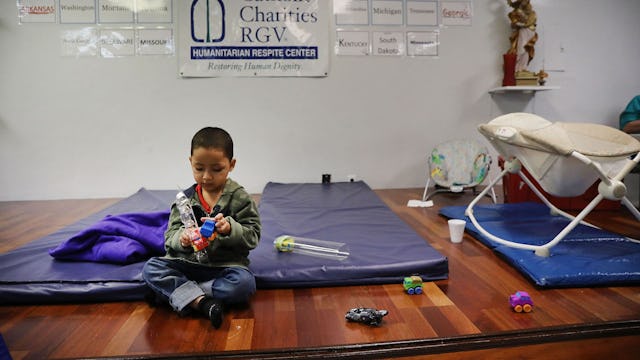Here's What It's Really Like Living In Detention Centers -- Straight From Child Detainees

Kids talk about what life is like living in border detention centers
In a heartbreaking New York Times article, kids in immigration detention centers across the United States are sharing what day-t0-day life is like there, locked up away from their families. Their stories will absolutely gut you, because knowing there are children locked up is one thing — hearing all the horrifying details is quite another.
In all of them, there are some common threads. No misbehaving. No sitting on the floor. No sharing food. No nicknames. Lights out at 9 p.m. Lights on at dawn. Make your bed every morning according to the instructions on a poster on the wall. Scrub every surface in the bathroom. Wait in line for everything: meals, recreation time, bathroom breaks. No touching or hugging, even your little brother or sister.
If it sounds horrible and inhumane, that’s because it is. How can anyone think it’s OK to tear kids away from their parents and then make them live this way?
But the stories in the New York Times go deeper than that.
Diego, a 10-year-old boy from Brazil, is proud that he didn’t cry when he was separated from his mother in late May. At a detention center in Chicago, he became fast friends with a few other boys he shared a room with. He calmly described how he learned to stay away from a particular staff member “who was not a good guy,” and how staff drugged one boy who frequently became upset.
“They applied injections because he was very agitated,” Diego said. After his injections, “He would fall asleep.”
15-year-old Yoselyn recalled girls making escape attempts during recreation time.
“No whispers, no planning — just an out-of-nowhere dash for the fence. No one made it.”
She also told the New York Times she was confused and sometimes upset by the lack of information the girls in her detention center were given about their own fates.
“Some of the girls said we were going to get out,” she recalled. “Others said they were going to deport us.”
Victor celebrated his 11th birthday in a detention center called Casa Guadelupe. His younger sister was also there, though they were rarely allowed to see one another. They had no idea where their mother was.
When Victor awoke on his birthday, he was confused that no one knew. No one sang to him like his mother would have. The only response he received when he told guards about his big day was a gruff, “feliz cumpleaños.”
The children innocently tell these stories of prison-like conditions where they were forced to stay indefinitely after being literally kidnapped from their parents by border security officials. But a detention center worker, the only person interviewed by the New York Times who wasn’t a detained child, tells a story of mischievous boys making mooing sounds at each other at lights out time.
“They just think it’s funny. They just do it long enough so everyone can hear, and then we all start laughing,” the Casa Padre employee, who is not named, said.
Yes, all the boys and the guards laugh and laugh and have the best time, as if it’s summer camp and not a literal child prison filled with cages. We believe that version of events, especially when contrasted with the horribly sad stories the kids themselves told. Except not really. The kids have no reason to lie. And they’re the ones being horribly mistreated by the U.S. government.
The ramifications of this policy will continue to unfold, even as the Trump administration rushes to meet a court deadline ordering them to reunite some of the youngest kids with their parents. But thousands of children will remain in these detention centers, treated like criminals simply for seeking safety in what is supposed to be one of the strongest countries in the world. The things these kids will remember tell the true story: The United States is weak, cowardly and inhumane.